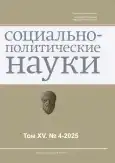Regulation of socio-cultural adaptation of foreign citizens in the Russian Federation at the present stage: the experience of the Working group under the State Duma Committee on nationalities (2022–2025)
- Authors: Volokh V.A.1,2, Udaltsov I.S.3,4
-
Affiliations:
- State University of Management
- Zhirinovsky University of World Civilizations
- State Duma of the Russian Federation
- Moscow State Institute of International Relations (University) of the Ministry of Foreign Affairs of the Russian Federation (MGIMO University)
- Issue: Vol 15, No 4 (2025)
- Pages: 97-105
- Section: Political Institutions, Processes and Technologies
- URL: https://journal-vniispk.ru/2223-0092/article/view/348438
- DOI: https://doi.org/10.33693/2223-0092-2025-15-4-97-105
- EDN: https://elibrary.ru/WUTDMY
- ID: 348438
Cite item
Abstract
The article analyzes the experience of the functioning and legislative work of the Working Group on the Regulatory and Legal Regulation of Socio-cultural Adaptation and Integration of Migrants, refugees and Internally Displaced Persons located in the territory of the Russian Federation under the State Duma Committee on Nationalities. The relevance and importance of the state policy of the Russian Federation in the field of socio-cultural adaptation and integration of foreign citizens is considered. The authors emphasize that the effective integration of migrants is a key task set out in the country’s strategic documents. The authors focus on the potential risks associated with the lack of effectiveness of existing adaptation mechanisms, such as social tension, ethnic strife and the formation of ethnic enclaves. The article describes the history of the formation of the Working Group as a platform for interdepartmental dialogue in the context of increased public attention to migration issues, its main tasks and directions. The formats of the Working Group’s activities are characterized, and the main legislative initiatives of the working body related to improving regulatory mechanisms in the field of labor migration and countering terrorism are analyzed. A completely new draft law “On State regulation of employment activities for foreign citizens in the Russian Federation” is proposed as such a mechanism.
Full Text
##article.viewOnOriginalSite##About the authors
Vladimir A. Volokh
State University of Management; Zhirinovsky University of World Civilizations
Author for correspondence.
Email: v.volokh@yandex.ru
ORCID iD: 0000-0003-1292-7631
SPIN-code: 1148-3816
Dr. Sci. (Polit.), Professor, Professor
Russian Federation, Moscow; MoscowIvan S. Udaltsov
State Duma of the Russian Federation; Moscow State Institute of International Relations (University) of the Ministry of Foreign Affairs of the Russian Federation (MGIMO University)
Email: udaltsova@duma.gov.ru
ORCID iD: 0000-0003-4748-3719
SPIN-code: 1321-0829
assistant to the Deputy, member, Working Group on the Normative and Legal Regulation of Socio-cultural Adaptation and Integration of Migrants, Refugees and Internally Displaced Persons Located on the Territory of the Russian Federation under the State Duma Committee on Nationalities, Faculty of International Journalism
Russian Federation, Moscow; MoscowReferences
- Bazhan T.A. Socio-cultural integration of foreign citizens in the system of state migration policy. Azimut of Scientific Research: Economics and Management. 2018. Vol. 7. No. 3 (24). Pp. 24–30. (In Rus.)
- Bulavina M.A., Novoselsky S.O. Science and education in Russia and Donbass: comparative legal analysis and prospects for cooperation. In: Russia and Donbass: Prospects for cooperation and integration. Proceedings of the International Scientific and Practical Conference. Moscow, 2022. Pp. 230–234.
- Voronina N.A. Legislation on the adaptation and integration of migrants in the Russian Federation: Development trends. Bulletin of the Saint Petersburg University of the Ministry of Internal Affairs of Russia. 2019. No. 3 (83). Pp. 63–82. (In Rus.)
- Voronina N.A., Volokh V.A. Peculiarities of migration legislation development in the Russian Federation. In: The role of social justice in ensuring traditional Russian spiritual, moral, cultural and historical values. Materials of the International Scientific and Practical Conference. Moscow, 2025. Pp. 41–46.
- Zolkin A.L., Novoselsky S.O., Ignatova M.N. et al. Migration policy management as a factor of national security. Questions of Political Science. 2024. Vol. 14. No. 9 (109). Pp. 3183–3196. (In Rus.)
- Ledeneva V.Yu., Rakhmonov A.Kh. The influence of “migration potential” on the economic and demographic development of donor and recipient countries. Bulletin of MGIMO University. 2023. No. 16 (6). Pp. 250–269.
- Martyushov V.F., Abu-Abed F.N., Verpatova O.Yu. Basic principles of building a system of social adaptation of foreign citizens to the educational environment of a Russian university. Bulletin of Tver State Technical University. Series: Social Sciences and Humanities. 2017. No. 2. Pp. 41–48. (In Rus.)
- Mishina O.A. Actual problems of social adaptation, upbringing and education of migrant children in school educational institutions of the Republic of Mordovia. Historical Search. 2021. Vol. 2. No. 1. Pp. 73–81. (In Rus.)
- Mozgovaya E.I. Socio-cultural identification of migrants in modern Russia. In: Social work in the modern world: The interaction of science, education and practice. Materials of the VI International Scientific and Practical Conference. 2014. Pp. 368–370.
- Omarov M.O., Osmanov G.I. Political and legal aspects of regulating the processes of socio-cultural adaptation and integration in modern Russian society. Education and Law. 2021. No. 9. Pp. 419–426. (In Rus.)
- Serdyukov K.N., Vinokurova A.V. Migration policy and problems of foreign labor migration in the Russian Federation (based on the materials of an expert survey). Theory and Practice of Social Development. 2024. No. 3 (191). Pp. 67–73. (In Rus.)
- Slutsky L.E. Sovereignty of the state as a factor of stability of modern international relations. Bulletin of the Moscow University. Episode 12: Political Science. 2021. No. 1. Pp. 7–13. (In Rus.)
- Starchenko V.S. Migration policy in Russia today. The problem. In: Facets of culture: Actual problems of history and modernity. Collection of articles of proceedings of the XIX All-Russian Scientific Conference with International Participation. Moscow, 2025. Pp. 376–385.
- Tkacheva N.A., Belonozhko M.L. Migration policy and security of the individual, society and the state. Monograph. Tyumen: Tyumen State University, 2013. 232 p.
- Tsygankova A.A., Pyatnitsyna I.M., Sysoeva A.A. The use of artificial intelligence for the adaptation and education of foreign students in Russia. In: AI technologies in science and education. Collection of abstracts of the II International Youth Scientific Conference and project materials. Moscow, 2025. Pp. 69–71.
Supplementary files








